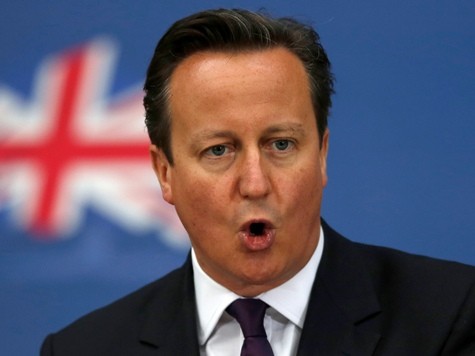Watch what he does, not what he says: even while Prime Minister David Cameron was in the Commons this week accepting praise from his eurosceptic backbenchers for the way he “stood up for British interests” at the European Council on June 27, we now know that just a week earlier his ministers had quietly agreed to transfer more British policing and justice powers to the EU institutions.
According to the Times, a week before the European Council meeting at which Cameron made what he claimed was a “principled stand” against the nomination of Jean-Claude Juncker as new president of the European Commission, Cameron’s ministers signed off in Brussels to a list of 35 “areas of cooperation,” including the notorious European Arrest Warrant.
The Times also claimed that in “a revelation certain to enrage Tory Eurosceptics, a leaked document also shows that ministers have opened the door to the sharing of DNA records.”
However, the Times does not have the not the full story, although it has secured important leaked documents.
In fact the pressure by the EU on Britain to open its DNA database has nothing to do with the Lisbon Treaty opt-outs or what was signed off last month. Instead, EU officials are using blackmail over asylum seekers and immigrants to force the UK to open its national DNA database, which holds confidential information on millions of innocent Britons, to the law enforcement agencies of other member states, even though there is nothing in any treaty which obliges Britain to do so.
Any agreement would be entirely separate from the hand-over of the powers in the 35 “areas of cooperation” signed off the week before the European Council, a hand-over which goes back to the opt-out the UK secured under Article 10 of Protocol 36 of the 2009 Lisbon Treaty.
This protocol enabled the government to decide by May 31, 2014 whether or not the UK should continue to be bound by the 133 police and criminal justice powers which were transferred to EU institutions before the treaty entered into force, or whether it should exercise its right to opt out of them all.
Far from “returning powers to Britain,” Cameron’s ministers have now surrendered powers in 35 areas. This silent transfer of police and justice powers, which Number 10 claimed in a Press Association report was “in the national interest,” will take effect on December 1.
However, the EU historian and blogger Dr Richard North says: “The Times is eliding entirely separate matters and confusing the issues.[In the matter of access to the DNA database] We are looking at a technical decision to be made by the UK government, as to whether to take part in the Prüm convention.”
The convention is an intergovernmental treaty – that is, a treaty of countries acting as independent states, not a treaty of the EU — signed by seven European countries and implemented in 2008.
“It is a treaty on the exchange of police information, whereby some EU member states have granted each other access rights to their automated DNA analysis files, automated fingerprint identification systems and vehicle registration data.”
Now the EU has adopted the convention as its own, and has asked Britain if it wants to join. Britain has indicated it will delay a decision on the DNA database until December 31st, 2015 – six months after the next election.
According to Dr North, “The bigger issue, though – which The Times seems to have missed altogether – is that the ‘colleagues’ seem to be blackmailing the UK.”
“Until we decide on Prüm, they are refusing access to the Eurodac system. This is a database of fingerprints of applicants who have applied in any member state for asylum, and illegal immigrants who have been picked up within EU member state territories.”
“This database is an essential tool in making the Dublin Regulation work” – the regulation establishes which member state is responsible for examining applications for asylum – “without which the UK will have serious difficulty in detecting and then deporting asylum seekers who have already been processed by another EU member state.”
“Thus, we seem to be in a position where effective cooperation on illegal immigrants and asylum seekers is dependent on the UK signing up to a much wider DNA database, with widespread implications over the entire justice system.”

COMMENTS
Please let us know if you're having issues with commenting.